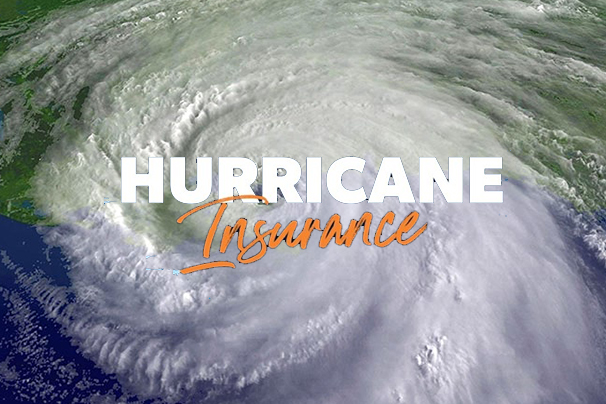A hurricane insurance policy is the joining together of different insurance plans to safeguard against the destructive forces of wind and water. Typically, this means a fusion of policies that offer coverage for your home and possessions, as there isn’t a singular hurricane insurance policy. However, average home insurance won’t extend coverage to all hurricane-related incidents.

While the Atlantic hurricane season spans from June to November, homeowners ensure to possess suitable coverage before the initial winds of a hurricane make landfall. For those residing in regions with hurricane incidents, it’s advisable to secure sufficient coverage to cover the cost of rebuilding your home. In addition, it can cause significant destruction. Relying only on a standard home insurance policy may not provide the right protection for all damages.
How Does It Work?
Hurricane insurance distinguishes itself from standard homeowners insurance, which is calculated as a percentage of the home’s value. Meanwhile, homeowners insurance has a fixed amount ranging from $500 to $2,000.
Additionally, hurricane insurance is often 2% to 5% of the home’s insured value, ranging from $2,000 to $5,000 for every $100,000 in-home coverage. To get hurricane insurance, there is often a named hurricane in the vicinity.
The hurricane insurance remains effective for any ensuing damage until the storm is downgraded, with regulations differing by state. In situations where a hurricane deductible doesn’t extend coverage, you can consider windstorm insurance.
This insurance applies to damages caused by any form of high wind. It can be reduced to less than hurricane insurance, sometimes as minimal as 1% of the property’s insured value.
Does the Homeowner’s Insurance Cover Hurricane Damage?
A typical home insurance policy includes coverage for wind damage, including winds associated with hurricanes. However, certain places may have exclusions for wind damage. It is advisable to purchase a separate policy for wind-related issues.
Home insurance typically provides coverage that assists when your home is affected by a hurricane, which includes;
Dwelling Coverage
In a situation where your home is destroyed in a hurricane incident, your insurance policy helps cover the costs of fixing or replacing your dwelling. Also, the specific damage falls under the exclusions outlined in your policy.
Your coverage limit is the highest payout from your policy if your house faces destruction due to a covered issue, minus the deductible. A deductible is the total subtracted from your home insurance claim check.
Other Structures Coverage
Beyond your house, other structure coverage pays for repair or replacement structures like a garage or shed. This coverage typically amounts to about 10% of your dwelling coverage, though the specific percentage may vary among insurance providers.
Personal Property Coverage
Generally, personal property coverage ranges from 50% to 70% of your dwelling coverage and pays you for repairing or replacing items affected by covered incidents within your home.
Additional Living Expenses Coverage
This particular coverage, also known as loss of use, covers additional expenses if you reside far from your home when it becomes uninhabitable. These may include expenses like meals and hotel bills, and the coverage is often a percentage of your dwelling insurance.
Does Home Insurance Cover Wind Damage From Hurricanes?
Typical homeowners insurance includes protection against wind damage. However, if you are residing in an area with frequent hurricanes, coverage might be excluded.
Moreover, secure windstorm coverage with higher deductibles specifically for your home insurance policy. Also, if your policies do not extend coverage to windstorm damage, you may purchase wind coverage or secure separate windstorm insurance.
Does It Cover Water Damage from Hurricanes’?
Homeowners insurance extends coverage to some water damage but not all water-related damages. This includes when rain blown by the wind sneaks in through a messed-up roof.
However, it turns a blind eye to the havoc caused by floods, such as a storm’s watery surge. If your place gets waterlogged, you better have a separate flood insurance plan to foot the bill for fixing things up.
How Much Does It Cost?
Some homeowners make an annual payment of $2,178 to safeguard their homes from hurricane incidents. The standard homeowner’s insurance makes an annual payment of $1,445, and an additional $734 is the going rate for flood insurance.
Furthermore, additional windstorm coverage could cost up to a few hundred bucks, but it depends on the worth of your home. If you reside in a flood-prone zone, you could spend a few thousand dollars only on flood insurance.
As your property value increases, so does the price tag on homeowner’s insurance, potentially reaching a few grand. Lastly, it’s important to note that the more you dig, the more you stand to lose when hurricane season rolls around.
How the Hurricane is Deductible Calculated?
To a certain extent, based on your state, insurance companies authorize the level of hurricane deductible and where it applies. Moreover, this policy is issued to state insurance departments and may authorize different obligations.
Also, residents have a choice of a flat-rate hurricane deductible of $500 or the flexibility to choose from other state-mandated options. This includes 2%, 5%, or 10% of their residence’s insured value.
In certain states, homeowners can catch a break on insurance premiums by beefing up their defenses against hurricane mayhem.
Conclusion
Hurricane insurance typically involves a merger of plans that cover your residence, safeguarding against potential damages from various sources. These various sources include your home, flooding, and, in specific regions, strong winds.
